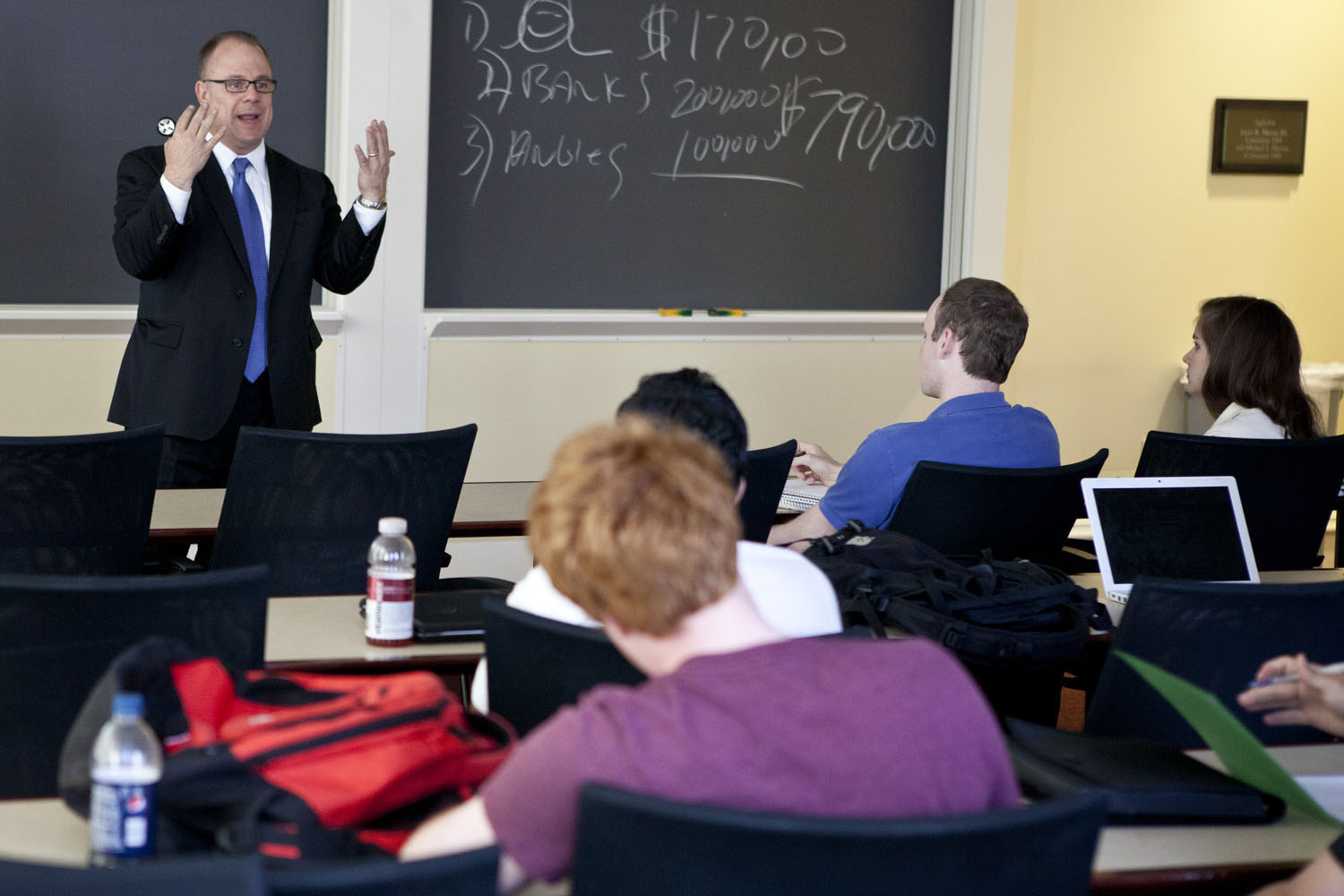March 19, 2012 — Apple. Facebook. Google. All household names today, but this was not how they started. Each began as a start-up company, headed by an entrepreneur.
Thirty students in the McIntire School of Commerce's entrepreneurship track hope to one day create a business known worldwide.
About three years ago, McIntire's entrepreneurship course evolved into a "track" – an area of study that supplements the school's offered concentrations – and today enrolls 30 fourth-year students, each trying to come up with a good business idea to pitch to venture capitalists at the end of the semester.
The track came to be thanks in large part to Mark Galant, a 1980 McIntire alumnus, who provided the greater part of the funding for it, according to Brendan Richardson, a lecturer in the McIntire School who co-directs the area.
Galant, an "angel" investor who currently runs Tydall Trading L.L.C. of New York, wanted to give McIntire students a greater chance to succeed as entrepreneurs – especially considering how much cheaper and easier it is to start a business today with the Internet than it was even a decade ago.
At the time of Galant's initial gift in 2008, McIntire offered only one entrepreneurship course, while its peers were teaching a dozen or more, noted Richardson, himself a venture capitalist.
He classified students in the track as independent thinkers. "Students that take the entrepreneurship track tend to have this creative DNA or bug that keeps gnawing at them," he said. "They want to do something in their own way or differently."
Tom Chen, a fourth-year student pursuing the entrepreneurship track, decided to become an entrepreneur after originally pursuing a different path in sales and trading. "I realized I wasn't passionate about it," he said. "It just didn't feel like I was impacting anyone."
He said he finds entrepreneurship more satisfying. "Every morning you look forward to the grind because you're passionate about it, and in that sense what you do no longer becomes 'work' because you're unifying work and love."
At the core of the track are courses on entrepreneurship and venture capitalism, allowing students to see the point of view of both the investor and start-up owner. The track culminates with a capstone course in the students' final semester.
Students have told Richardson that the entrepreneurship track is "the best crystallization of all the things they've learned at McIntire," he said. Any business touches all of McIntire's concentrations – accounting, finance, information technology, management, marketing. In the entrepreneurship track, students bring together everything they have learned and put it to use in a full-fledged business proposal.
As part of the capstone course, student groups create start-up businesses. This semester's businesses range from videography services to a website targeted at mothers. Each group will have the chance to pitch its ideas to real venture capitalists at the end of the semester.
Richardson hopes the students will get a taste for what entrepreneurship is like. He wants them to understand the risks an entrepreneur must take and have the chance to fail while they are in college. An entrepreneur must be "a violent optimist and be comfortable living in uncertainty," he said. Richardson would prefer students understand this before graduation, rather than learning it when their livelihoods are at stake.
Chen has already had his fair share of ups and downs in business. He has attempted to create a U.Va. event compilation site and a daily deal website. His capstone group's start-up is a reality television show on which up-and-coming traders will compete for monetary prizes and job offers.
While Chen ultimately abandoned his first two business ventures, he said these small start-up businesses have given him the practical experience to lead him to success in the future. "Entrepreneurship is a subject that can't be lectured – it has to be experienced," he said. "You have push yourself outside of your comfort zone into the real world and learn from your failures."
This year's entrepreneurship track will culminate with the Galant Center Challenge on April 18, featuring five to six investors looking to invest up to $250,000 each in students' start-up companies. The top three groups from the capstone course will have the chance to pitch their ideas in front of the investors with the potential of any one, or even all of them, being funded.
"Even if they aren't funded, the experience these three teams will get will be invaluable," Galant said.
– by Lisa Littman
Media Contact
Article Information
March 21, 2012
/content/mcintire-students-pursue-passion-entrepreneurship-real-money-stake

